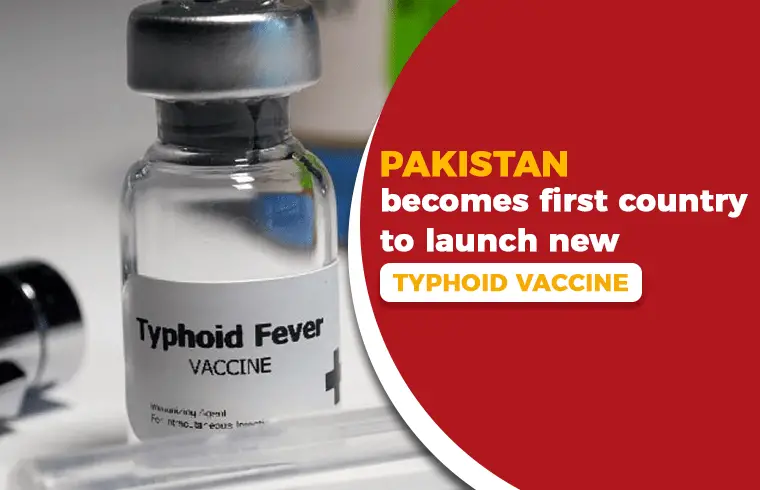
Karachi, 15 November 2019- Pakistan becomes first country to launch new typhoid vaccine that is typhoid conjugate vaccine (TCV). The new vaccine (TCV) is approved by WHO. It’s good news for Pakistan who will combat typhoid by vaccinating 10 million children initially, in two-week immunization program starting from November 18 to November 30 in the urban areas of Sindh, the province of Pakistan. Later on, the government would expand it to the rest of the country on the basis of a phased national introduction strategy, Dr Zafar Mirza, Special Assistant to Prime Minister on Health, said.
Gavi, the vaccine alliance, updated on 15 November 2019 that “Pakistan today became the first country in the world to introduce the World Health Organization (WHO)-recommended typhoid conjugate vaccine (TCV) into its routine immunization program. It is the first typhoid vaccine that can be given to children as young as 6 months of age and confers longer term protection against typhoid. The government of Pakistan is launching the vaccine introduction with a campaign in Sindh Province, which is the center of an ongoing extensively drug-resistant (XDR) typhoid outbreak that began in November 2016.”1
Pakistani Official’s Remarks:
Dr Syed Saqlain Ahmad Gilani, national programme manager for the federal Expanded Programme for Immunization (EPI) said, “The recent GAVI commitment of US$ 85 million in funding to support the introduction of typhoid conjugate vaccines is a great opportunity for Pakistan. We have previously introduced vaccines against pneumonia, diarrhea and the injectable polio vaccine. The launch of the typhoid vaccine will be another step towards improving the immunity of our children against disease.”
While in a recorded video message, Dr Seth Berkley, CEO of Gavi, says, “The typhoid conjugate vaccine will not only save lives, but also bolster the fight against anti-microbial drug-resistance. Expanding vaccine coverage will play an important role in reducing illnesses and deaths from typhoid. Gavi is looking forward to working with countries to support the introduction of this safe and effective vaccine.”2
Currently Approved Vaccines for Typhoid
According to WHO, there are three typhoid vaccines that are currently recommended for use by:
- An injectable typhoid conjugate vaccine (TCV), consisting of Vi polysaccharide antigen linked to tetanus toxoid protein licensed for children from 6 months of age and adults up to 45 years of age;
- An injectable unconjugated polysaccharide vaccine based on the purified Vi antigen (known as Vi-PS vaccine) for persons aged two years and above; and
- An oral live attenuated Ty21a vaccine in capsule formulation for those over six years of age.3
Global Resurgence of Typhoid
Typhoid is becoming the global resurgence now a days. According to the most recent estimates, between 11 and 21 million cases and 128,000 to 161,000 typhoid-related deaths occur annually worldwide.3
While, Pakistan’s current extensively drug resistant (XDR) outbreak of typhoid, which has infected more than 10,000 people, mostly in Sindh province, is the first-ever reported outbreak of typhoid resistant to the drug ceftriaxone (a third generation antibiotic).
Let’s see, what is Typhoid actually? How can we prevent this disease?
Pathogen
Salmonella Typhi is the bacteria which is responsible for Typhoid.
Symptoms
Symptoms are the events that patients feel.
- Fever- goes up and down, up-to 103°C and 104°C
- Vomiting- can also occur.
- Pain in Tummy- Sometimes stomach pain may occur.
- Headache- may be mild to moderate and some cases severe.
- Rashes- very often rashes appear after the third or fourth day.
- Extreme Lethargy– Patients feel extreme lethargy.
- Tiredness and Fatigue– There is tiredness and fatigue condition in Typhoid patients.
- Constipation or Diarrhea– There may be either constipation or diarrhea in these patients.
What should be done ?
Blood Test- if you are suffering from high grade fever from two or three days, then you may go for blood test.
Within 24-48 hours you can go for blood test called “Typhidot” or after 5 days you can go for “Widal Test”.
What Else You Should Do?
Complete Bed Rest– Patients should take complete bed rest.
Re-hydrate your body- Make sure you have enough fluids to re-hydrate your body.
Small frequent meals– So that to avoid vomiting and get seamless nutrition all the day.
Don’t go outside- Because this is really an exhausting illness.
Intravenous Fluids- Very often, if it is not controlled in time, you may go for intravenous fluids or at worst you may go for hospitalization.
Transmission of Typhoid
Poor Sanitation & Hygiene
Contaminated Water– Metropolitan cities are at great risk of contaminating their fresh water reserves with wastes and drains that mix up and spread Salmonella Typhi when people dink that water.
Contaminated Food– Second mode of transmission of Typhoid is by eating contaminated food.
Why Typhoid becomes extensively drug resistant (XDR) ?
Typhoid becomes resistant due to MISUSE of Antibiotics both at Doctor’s and Patient’s side.
Doctors:
Doctor’s extensive practice of using 3rd generation and 4th generation antibiotics without starting from 1st and 2nd generations antibiotics. Another reason is Gap in Healthcare triangle of Doctor-Nurses-Pharmacists. There is no consultation between doctors and pharmacists regarding selection of medicines, treatment plans and proper dosage.
Patients:
Patient’s misuse of antibiotics without qualified healthcare practitioner’s recommendation. Patients, most of the times, not follow the recommended dosage schedule of antibiotics and do not consult with Pharmacists.
Protective Measures
1- Wash hands before:
- Eating food
- Cooking food
- You feed the children or elderly
2- Clean the utensils in which you store, cook and eat food.
3- Avoid outside food that is suspected to be contaminated and eat home made food.
Prevention
Vaccination- the only way of prevention is vaccination, preferably new Typhoid Vaccine (TCV) which is according to WHO more effective and safer than previous vaccines.
FAQs:
What is typhoid vaccine used for?
Typhoid vaccine is used for combating the Typhoid. Typhoid is sometimes known as “Typhoid Fever” that is caused by a bacteria, “Salmonella Typhi”.
Is Typhoid vaccine necessary?
Yes, it is necessary to cope global resurgence of Typhoid, to take Typhoid vaccine. Without vaccination bacteria becomes powerful that cause severe illness and death may occur if untreated.
How long is typhoid vaccine good for?
Typhoid vaccine can be taken at least up to the age of 10 years while travelers must get shots of Typhoid vaccine up to the age of 16 years.
Is Typhoid vaccination painful?
There are two types of vaccination by route:
1- Oral Vaccine
2- Injectable Vaccine
Taking oral vaccination is not painful While injectable vaccine may cause some redness, slight swelling, soreness, hardness at the site of injection.Can typhoid kill you?
It depends on severity of infection, your immune response and timely taking medications.
According to the most recent estimates, between 11 and 21 million cases and 128,000 to 161,000 typhoid-related deaths occur annually worldwide.Which is better oral or injectable typhoid vaccine?
According to WHO, typhoid conjugate vaccine (TCV) is better than oral vaccine, in effectiveness and safety.
Is the typhoid vaccine dangerous?
Like every medicine, Typhoid vaccines also has some sort of side effects that may occur and vary from patient to patient, such as, fever and allergic reactions.
Which injection is best for typhoid?
There are 3 types of Vaccines recommended by WHO.
1- An injectable typhoid conjugate vaccine (TCV), consisting of Vi polysaccharide antigen linked to tetanus toxoid protein licensed for children from 6 months of age and adults up to 45 years of age;
2- An injectable unconjugated polysaccharide vaccine based on the purified Vi antigen (known as Vi-PS vaccine) for persons aged two years and above; and
3- An oral live attenuated Ty21a vaccine in capsule formulation for those over six years of age.
Out of three WHO prefers typhoid conjugate vaccine (TCV) in effectiveness and safety.
References:
2- https://www.youtube.com/watch?v=VY7ikJaSqDg
3- https://www.who.int/immunization/diseases/typhoid/en/
FDA Approves New Evidence that Cosentyx Inhibits Scalp Psoriasis

7 Steps to Prepare for a Doctor’s Appointment






